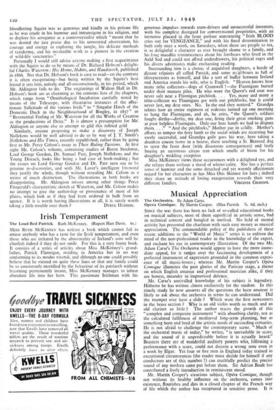Musical Appreciation
The Orchestra. By Adam Carsc.
Opera Comique. By Martin Cooper. (Max Parrish. 7s. 6d. each.)
SINCE the war there has been no lack of so-called educational books on musical subjects, most of them superficial in artistic sense, bad in technical content and bungled in method. No field of mental activity has presented the charlatan with such easy money as musical appreciation. The commendable policy of the publishers of these recent additions to the " World of Music " series is to enliven the mind of the non-professional reader in the knowledge of the expert, and enchant his eye in contemporary illustration. Of the two Mr.
Adam Carse's The Orchestra would appear to have the more imme- diate appeal, for it ranges over the fascinating development of a perfected instrument of expression grounded in the common experi- ence of all music-lovers ; whereas Mr. Martin Cooper's Opera Comique illumines the past glories of the Parisian stage, a theme on which English amateur and professional musician alike, if they are honest, meander in improvised defence.
Mr. Carse's unrivalled knowledge of his subject is legendary. Hitherto he has written Almost exclusively for the student. In this timely study he now answers all the questions the keen amateur is likely to ask about the orchestra in terms he can understand. Did the trumpet ever have a slide ? Which were the first newcomers in the brass section ? Why is an old violin worth so much and an old clarinet so little ? The author traces the growth of this "complex and composite instrument " with absorbing clarity, not as the calculated fulfilment of mediaeval long-term planning, but as something born and bred of the artistic needs of succeeding centuries. He is not afraid to challenge the contemporary scene. " Much of the orchestral music of today," he writes, " is unreadable in- score, and the sound of it unpredictable before it is actually heard." Boasters there are of wonderful auditory powers who, following a performance with a score, could not discern a wrong note even in a work by Elgar. Yet four or five men in England today trained in exceptional circumstances (the reader must decide for himself if any conductors are of this number !) can truthfully predict the precise sound of any modern score put before them. Sir Adrian Bonk has contributed a lively introduction in reminiscent mood.
Mr. Martin Cooper's vivacious subject, Opera Comique, though not without its healthy influence on the orchestra, comes into existence, flourishes and dies in a closed chapter of the French way of life which the author has recaptured in sensitive prose. It is
essentially a French art-form, and we are shown its crude, spon- taneous origins in the bawdy sideshows of the great Parisian fairs of the Middle Ages, and offered musical quotations characteristic of the sly. chaffing witticisms of these popular entertainments in which the musical element appears to have been a mere tag to horse- play and double entendre. Gradually this changeling child of plebeian and royal blood, nurtured by Italian foster parents, claims its musical birthright, outrages authority, and laughs its way into the Court. It would be an injustice to sketch an outline of Mr. Cooper's masterly narrative. He, too, issucs a challenge on which we might well ponder. " A superficial age can only giggle: true laughter comes from the depths." Mr. Cooper is a writer of first- rate quality. Both books are admirably illustrated by many appro- priate black-and-white drawings, prints and reproductions in colour, and each book is unlikely to be surpassed in its genre.
ERIC FENBY.



































 Previous page
Previous page